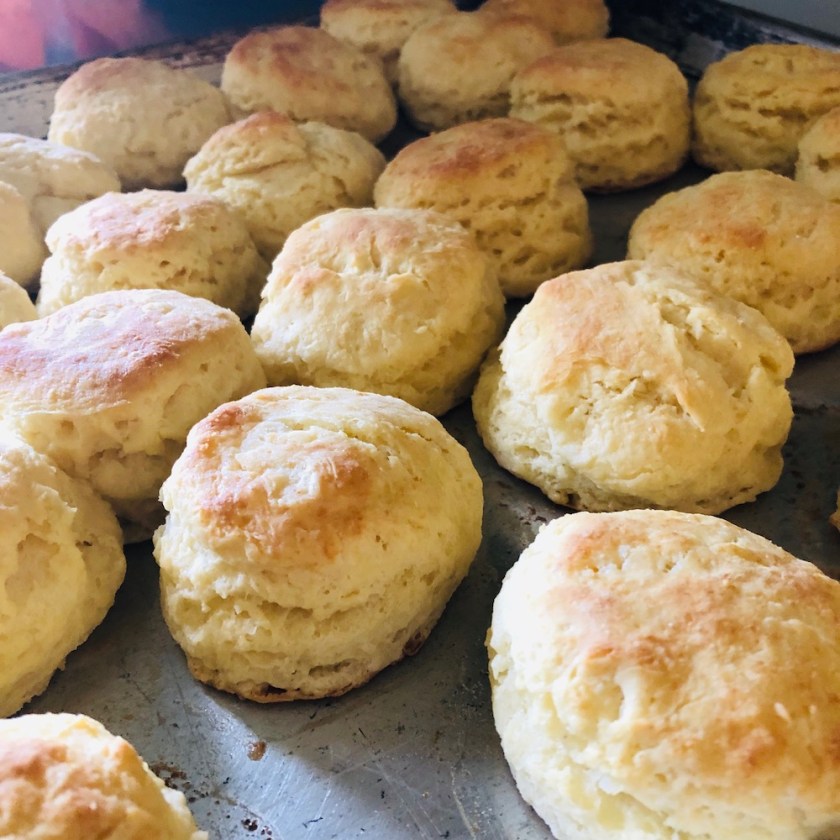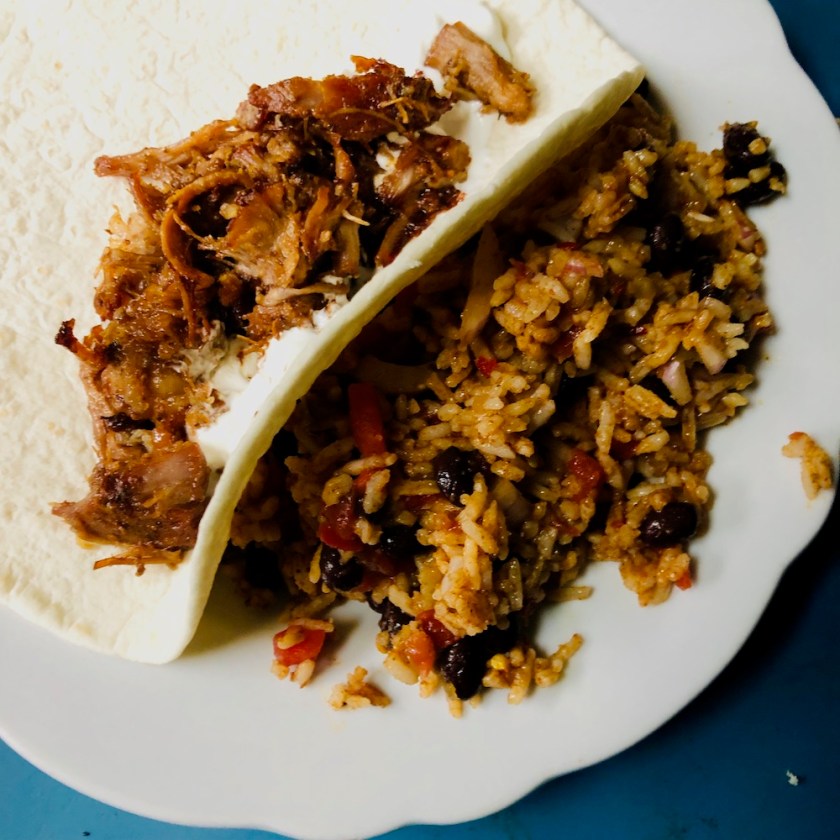Holy cow, that was a fast week. We worked hard and ate hard this week.
Wow, that does not sound right.
Well, here’s what we had:
SATURDAY
Meatloaf, cheezy weezies
Saturday was big dig day. Dig dig dig!

Why dig? Well, like everyone else, we don’t know what the summer is going to look like, so we went and bought a 20-foot above ground pool! To prepare the ground, you have to make it level, and remove all the rocks from the soil, so nothing pointy or poky makes a hole in the bottom.
Well, as you can see, there are a lot of rocks.

The ground is also not level, so we’re just . . . digging some more. And in some cases, hitting a giant hunk of gneiss with a sledgehammer until it’s flat enough to cover with soil. It’s an immense amount of work, but I am openly, obnoxiously enjoying having the whole family working wholesomely outside together on a project. Eventually we’ll get this done, and then we’ll level it, cover it with sand, level that, put down some foam, then a ground cover, and then POOL. Pool pool pool!
Oh, so I didn’t want to stop digging, so I sent Dora in to make some meatloaf.
Jump to Recipe

SUNDAY
Cobb salad
Well, approximately. We had lettuce (which I didn’t bother chopping), tomato, cucumber, avocado, hard boiled eggs, bacon, chicken, and some kind of shredded cheese, and some kind of dressing.

You’re supposed to have chives and Roquefort cheese, but nobody was complaining. They were too busy complaining that I only made four pounds of bacon.
You know, I’ve been beating myself up over my careless, slipshod ways because the grocery bills have been so high lately. So high, for like . . . two months now . . . oh. Yeah, right about the time we started having twelve people home 24 hours a day, I started spending more on food. SHAME ON ME.
Next time I’ll get more bacon.
MONDAY
Chicken burgers, raw veggies and dip

This picture makes me laugh because at first you’re like, “oh, good for her, look at all the vegetables” and then you’re like “wait, is that a demitasse cup brimming with french onion dip?” Yes, it is, and I licked it clean.
TUESDAY
Buffalo chicken salad, hot pretzels
Tuesday I went shopping. This is a great meal to throw together in a short amount of time: Salad greens, buffalo chicken cut into strips, crunchy fried onions from a can, shredded carrots, and either blue cheese or shredded pepper jack.

It’s better with ranch dressing, or buffalo ranch dressing, but it’s also good with whatever you have, if you’re hungry enough.
WEDNESDAY
Grilled pork ribs, cole slaw, strawberry rhubarb buckle
Damien made a sugar rub for the pork ribs, and grilled them over the coals. Nice and juicy.
Lena made a nice snappy peppy coleslaw.
Jump to Recipe

Look at that lovely color on the pork (no filter!). That sugar rub is magic– lots of flavor, and it gives it a wonderful caramelized crust.
Jump to Recipe
It says “chicken thighs,” but you can use it on all kinds of meat.
Now let’s talk about rustic fruit desserts!
Rus!
Tic!
Fruit-des-serts!
[clap!clap!clap-clap-clap]

There are a lot of them, with lots of subtle variations, but there are more names than there are variations. You know what pie is. You know what a crumble is. But what about cobbler? What about crisp? What about betty, buckle, slump, and grunt? The answer is: some are oven, some are stovetop, some are steamed, some have streusel, and some are just from Connecticut, so who knows. And honestly, which is more fun? Just quietly knowing something, or looking it up and then insisting your kids stand there and listen while you read out loud about it? I think we know.
I wanted to make something that was just fruity on bottom and sweet and crumbly on top, but I couldn’t find any cornstarch, so I ended up making a buckle, which is a sort of coffee cake with fruit layers. It was quite easy, and pretty delicious. And pretty.

It has a layer of cake, then a layer of strawberry, then cake mixed with sugared rhubarb, then a streusel. We had it with whipped cream on top, because it is Wednesday, my dudes.

When I shared this picture on Facebook, I captioned it “O my chevalier!” It’s okay if you didn’t understand right away that I said that because it’s a buckle. That’s a weird joke and doesn’t make sense. HOWEVER, don’t you think I should write a cookbook in the style of G.M. Hopkins? You’d buy that, right, you weirdo? I could call it Sprungform Rhythm Pans. I could call it Carrot Cake Comfort. I could call it . . . PIED BEAUTY THAT IS MADE OUT OF ACTUAL PIE.
I use my college degree all the time, why do you ask?
THURSDAY
Meatball subs
Dora to the rescue again. I was so useless on Thursday, and I’ll tell you why, so you can feel smart. I got up and grabbed my two morning pill bottles, which have my green thyroid and purple blood pressure pills in them. I thought to myself, “Huh, they’re white, that’s weird,” and I swallowed them. Then I thought, “Ooh, I need to call in a refill for these.” So I started calling it in, and then I was like, “Hey, how come these bottles have someone else’s name on them? That’s so weird!”
So yeah, I took someone else’s drugs, for no reason at all. That’s how dopey I was before I started to feel the side effects of someone else’s drugs, which included dopiness. (Luckily, the dopiness and a headache, because of course there had to be a headache, was all that happened.) I can’t explain how I could have come to do something so stupid, but there it is. I’m sure this brain fog will get better as I get older though, HO HO HO HO HO HO HO.
Anyway, here is the meatball sub:

And here is the oven-baked, less-mess meatball recipe:
Jump to Recipe
FRIDAY
Pizza
All I have to say about this is we are now a six extra large pizza family. Five pizzas is enough for dinner, but not enough for people to have cold pizza for breakfast the next day, so now we make six. I’m a good mother.
Meatloaf (actually two giant meatloaves)
-
5
lbs
ground beef
-
2
lbs
ground turkey
-
8
eggs
-
4
cups
breadcrumbs
-
3/4
cup
milk OR red wine
-
1/4
cup
Worcestershire sauce
plenty of salt, pepper, garlic powder or fresh garlic, onion powder, fresh parsley, etc.
-
ketchup for the top
-
2
onions
diced and fried
(optional)
-
-
Mix all meat, eggs, milk, breadcrumbs, and seasonings together with your hands until well blended.
-
Form meat into two oblong loaves on pan with drainage
-
Squirt ketchup all over the outside of the loaves and spread to cover with spatula. Don't pretend you're too good for this. It's delicious.
-
Bake for an hour or so, until meat is cooked all the way through. Slice and serve.
Smoked chicken thighs with sugar rub
-
1.5
cups
brown sugar
-
.5
cups
white sugar
-
2
Tbsp
chili powder
-
2
Tbsp
garlic powder
-
2
tsp
chili pepper flakes
-
salt and pepper
-
20
chicken thighs
-
Mix dry ingredients together. Rub all over chicken and let marinate until the sugar melts a bit.
-
Light the fire, and let it burn down to coals. Shove the coals over to one side and lay the chicken on the grill. Lower the lid and let the chicken smoke for an hour or two until they are fully cooked.
Coleslaw
-
1
head
cabbage, shredded
-
2
carrots, grated
-
5
radishes, grated or sliced thin (optional)
Dressing
-
1
cup
mayo
-
1
cup
cider or white vinegar
-
1/2
cup
lemon juice
-
1/2
cup
sugar
-
pepper to taste
-
Mix together shredded vegetables.
Mix dressing ingredients together and stir into cabbage mix.
Strawberry rhubarb buckle
You can substitute in all different combinations of fruit. Makes two buckles in 9-inch pie dishes. Serve with vanilla ice cream or whipped cream
-
4
lbs
strawberries, hulled and sliced
-
4
stalks
rhubarb, stringed and diced
For the cake:
-
1
stick
butter
-
1-1/2
cups
sugar
-
2
eggs
-
2
tsp
vanilla
-
1
Tbsp
baking powder
-
1
tsp
salt
-
1/2
tsp
nutmeg
-
4
cups
flour
-
1
cup
milk
For the streusel:
-
1
stick
butter
-
1/2
cup
brown sugar, packed
-
1
cup
flour
-
2
tsp
cinnamon
-
1/4
tsp
salt
-
1
tsp
almond extract
-
Preheat the oven to 350 and grease two 9" round pans
To make the cake:
-
In a bowl, beat together the butter and sugar.
-
Beat in the vanilla and sugar.
-
Stir in the baking powder, salt, and nutmeg
-
Alternate adding in the flour and the milk, a bit at a time. Set the batter aside.
To make the streusel:
-
Cut the butter into pieces, and then add in the other ingredients, mixing until it is crumby but not pasty.
To put it together:
-
Spread about 1/4 of the cake batter in each buttered pan.
-
Spread the sliced strawberries on top of that.
-
Add the rhubarb to the remaining batter and stir to combine. Spoon the rhubarb-batter mixture over the strawberries in each pan as evenly as you can (it's okay if it's gloppy).
-
Sprinkle the streusel topping over the batter in each pan.
-
Bake for about an hour, until the top is a bit browned and a toothpick comes out clean.
-
Serve with vanilla ice cream or whipped cream.
Meatballs for a crowd
Make about 100 golf ball-sized meatballs.
-
5
lbs
ground meat (I like to use mostly beef with some ground chicken or turkey or pork)
-
6
eggs, beaten
-
2
cups
panko bread crumbs
-
8
oz
grated parmesan cheese (about 2 cups)
-
salt, pepper, garlic powder, oregano, basil, etc.
-
-
Mix all ingredients together with your hands until it's fully blended.
-
Form meatballs and put them in a single layer on a pan with drainage. Cook, uncovered, for 30 minutes or more until they're cooked all the way through.
-
Add meatballs to sauce and keep warm until you're ready to serve.










































































